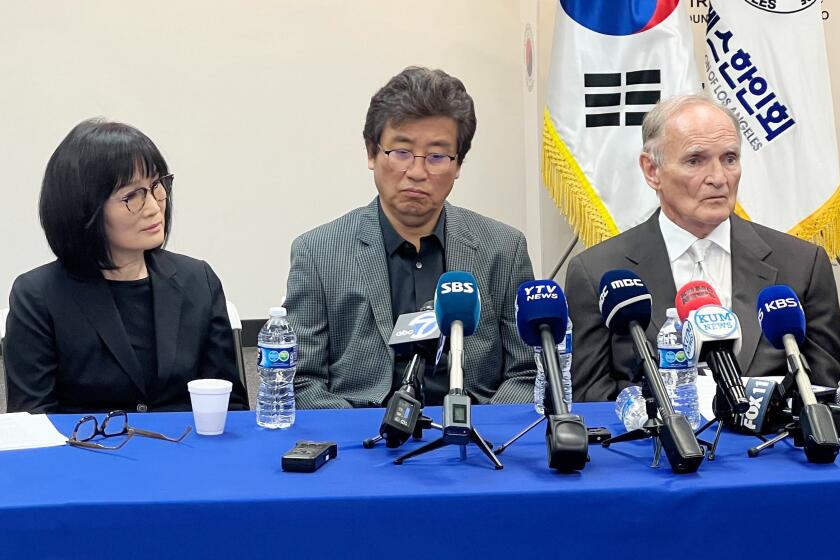Legal Sanctuary
Before Nina Donney was killed, before her husband beat and stabbed her as their two children listened in horror, Nina’s twin sister, Abby Leibman, was documenting an alarming escalation of violence against women.
As co-founder of the nonprofit California Women’s Law Center, Leibman had been helping draft state laws to shield women from what the center had identified as “an epidemic of violence at the hands of husbands and boyfriends.”
But until her sister’s death in 1995, there was nothing personal about Leibman’s campaign. Although an estimated 50% of all women in the nation have experienced an incident of violence in their marriage or relationship, Leibman could not know that this statistic would include a member of her own family.
As the Women’s Law Center in downtown Los Angeles observes its 10th anniversary with a fund-raising dinner Thursday night, Leibman and other attorneys and supporters look back on what has been accomplished over the past decade and look forward to what remains to be done.
One piece of legislation proposed by the law center addresses the very situation that Nina Donney found herself facing when she asked her husband for a divorce. Although it seemed clear the marriage could not be saved, the Donneys, like many couples, continued to live in the same house.
Ken Donney, then a 49-year-old lawyer, and Nina, a 38-year-old teacher at Santa Clara University, remained in their Santa Cruz home with their two young children while the divorce made its way through the court system.
“Ken, like many fathers, was worried about losing custody of his children if he moved out,” Leibman recalls. “You can imagine the incredible tension that results when two people who are completely estranged continue to share the same living space. This is when we typically see an escalation of family violence--or even the start of it, in families like my sister’s where it has not been present before.”
*
To defuse such explosive conditions, the law center recently asked the state Legislature to give judges guidelines that would prevent the courts from punishing the parent who leaves the home in custody matters. “Many family lawyers still advise fathers not to leave the house because it could be construed as abandonment of the children,” Leibman says.
According to court testimony and police reports, Ken Donney, who opposed the divorce, attacked his wife in the middle of the night as she slept in her bedroom. Their son, who was 7 at the time, and 4-year-old daughter apparently were awakened by their dying mother’s screams.
With Donney serving a 16-year-to-life prison term, Abby Leibman is raising her sister’s children. And that has brought home the urgency of other legal issues for women in California.
Since the law center’s early days in a back bedroom of Leibman’s Santa Monica apartment, the need for better access to quality child care has remained an elusive goal.
“Just as the discussion of family violence has been broadened since 1989 to show that wife-beating is not isolated to poor alcoholics, that family violence happens in upper economic circles as well,” Leibman says, “we’ve also expanded the definition of who needs child-care services.”
“Grossly inadequate” are the words the law center continues to use to describe the availability of such service to hundreds of thousands of California’s working mothers. And with pressure from federal welfare reformers to send recipients to work, including single mothers, the center predicts a continuing child-care crisis.
“As a single mom myself, I see evidence every day of the presumption that one parent--usually the mother--is at home during the day,” Leibman says. “Institutions like schools, doctors’ offices, Scouts--they all operate as if mothers are around during the workday.”
The law center’s child-care initiatives over the past decade and its efforts to “de-feminize” poverty in California remain challenges as the center begins its next decade. “Women, who comprise the majority of single heads of households in the state, are trapped in poverty in startling numbers” by discrimination against them in areas of family law and domestic violence, according to the center’s 10th-anniversary report on the status of women’s rights.
But there have been successes. “If you think back to 1990, back to the Anita Hill hearings in Congress, you’ll see that the term ‘sexual harassment’ was a term few people knew,” Leibman says. “Now, everyone knows what these words mean, and that is the first step to understanding this experience and finding ways to stop it.”
*
California women continue to file record numbers of complaints with the state Department of Fair Employment and Housing, more than a quarter of them involving sexual harassment. To address those complaints, the law center has:
* Developed model policies for state businesses and agencies to use in responding to sexual harassment.
* Spearheaded the effort to establish a Women’s Advisory Council to the Los Angeles Police Commission to address gender bias in law enforcement.
* Successfully sued the state Department of Education to force it to issue regulations to address sexual harassment in schools and sex discrimination in sports.
The law center’s nine-person staff and ranks of part-time volunteer attorneys also have reached out in the last few years to protect the rights of deaf and other disabled women, as well as provide free legal counsel to women who have suffered discrimination in housing or at work because they had breast cancer.
*
While the center’s goal of ensuring all the civil rights of women and girls in the state has not been fully achieved, there has been progress. “We are trying to bring a huge change to the whole culture,” Leibman says. “To do that, you have to be content with setting smaller goals and celebrating the little changes.
“Yet the very fact that we exist and thrive--that many people will pay $100 or $200 to taste food prepared by gourmet women chefs from women-owned restaurants and to be entertained by women comediennes--is evidence of the monumental respect people have for the needs of women in this state.”
As for the next 10 years, Leibman predicts more of the law center’s vision will be realized. “There will be more women in positions of making the law fair,” Leibman says. “And me? I will have two teenage children.”
* For information on the Justa Taste fund-raiser, contact Tarin Wilson at (310) 559-9334.
* Pamela Warrick can be reached by e-mail at pamela.warrick@latimes.com.
More to Read
Start your day right
Sign up for Essential California for news, features and recommendations from the L.A. Times and beyond in your inbox six days a week.
You may occasionally receive promotional content from the Los Angeles Times.






